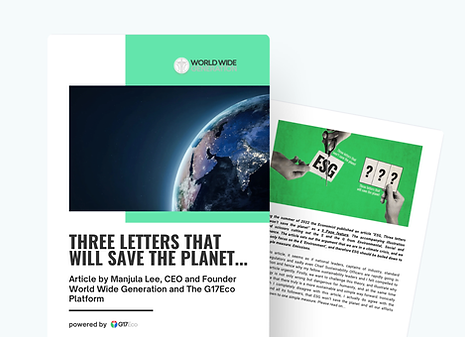
WHITE PAPERS
Explore our library of expert-led white papers, designed to help you navigate the evolving world of sustainability. Authored by our in-house specialists, these papers offer in-depth analysis on reporting standards, regulatory developments, and proven best practices. Whether you're looking to strengthen compliance or deepen your understanding of key sustainability topics, our white papers provide the clarity and guidance you need to lead with confidence.

Why financial institutions must measure & report portfolio-wide climate risks
This white paper explains why climate-related risks are now a core financial priority and offers a practical roadmap for embedding portfolio-wide climate intelligence into governance, risk models and disclosures. It summarises evidence, regulatory drivers, measurement approaches (scenario analysis, geospatial exposure, financed emissions) and practical steps to turn compliance into strategic advantage.

Materiality Tracker: The Methodology
This white paper unveils Materiality Tracker, G17Eco’s rules-based platform that transforms manual, consultant-led materiality assessments into fast, objective and regulator-ready insights.
It explains the full methodology, from algorithmic topic filtering to double-materiality scoring, showing how organisations can cut completion times from months to days, align with CSRD audit expectations, and build a defensible foundation for sustainability strategy and disclosure.

Three Letters
That Will Save the Planet
In this article, Manjula Lee, Founder & CEO of World Wide Generation and G17Eco, argues that sustainability must move beyond ESG to SEE: Social, Economic and Environmental balance.
Through a powerful “Mother Earth” metaphor, she reveals why focusing only on emissions treats symptoms, not causes. SEE reframes prosperity around well-being, equality and SDG contribution, a shift from measuring money to measuring meaning.
.png)
Everything you need to know about ISSB
This white paper explains how the International Sustainability Standards Board (ISSB) is creating a global baseline for sustainability reporting.
It outlines the two core standards: IFRS S1 (sustainability-related disclosures) and IFRS S2 (climate-related disclosures), and shows how they align with TCFD, SASB, and GRI to bring consistency, comparability, and investor confidence to corporate reporting.
Learn how companies can prepare for adoption and use scalable solutions to meet the new expectations starting 1 January 2024.